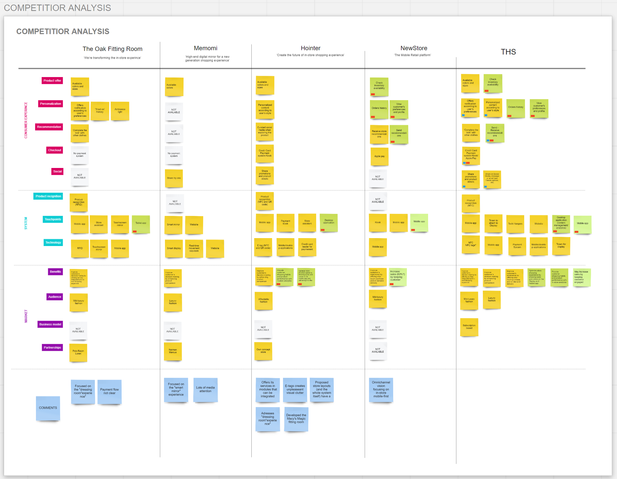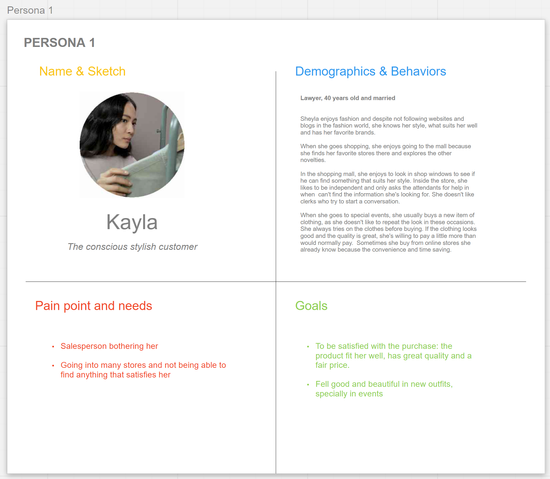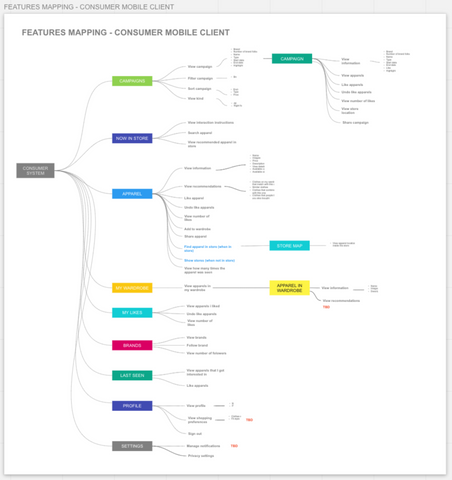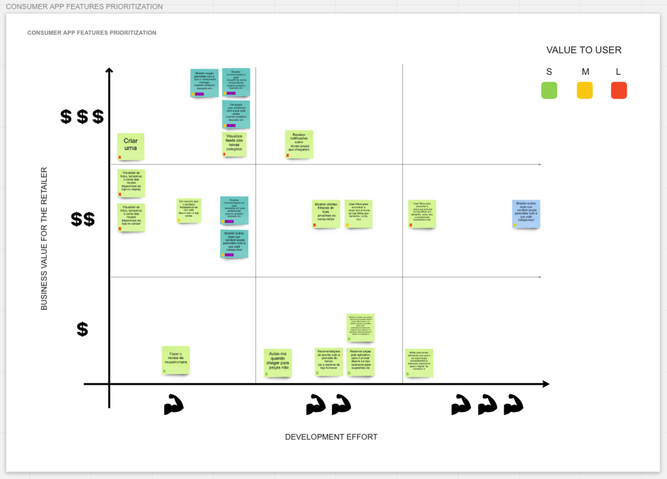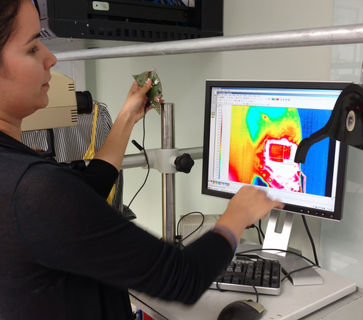

How might we improve the fashion retail experience by connecting the traditional brick-and-mortar to the digital?

THS, a startup looking for investors, joined forces with INDT to develop a prototype of a smart hanger.
It would collect data to retailers and help customers get more information about products inside the store.
A technology-driven idea that needed to find its value to both consumers and retailers

Understand first, sketch later
The shopping experience through customers' and retailers' eyes
Understanding the shopping experience inside the store was the stepping stone to finding out what problems we should be solving.
First, a deep dive into fashion retail
There was a lot going on with Fashion retail. The main takeaway was that there was a lot of expectation of how digital was impacting the traditional brick-and-mortar fashion industry.
Mapping User Journeys and creating Personas
Qualitative research with consumers and retailers was conducted to map the current user journey maps. Quantitative research was also conducted with consumers to design personas.
Defining the problem
The User Journey Maps and Personas clarified the pain points and what problems should be addressed to both customers and retailers.
For customers
'I can’t find the products that I like and fit me well’
’It’s sometimes hard and time-consuming to decide if I’m making a great purchase’
For retailers
’Lack of visibility of how interesting my products are for my customers’
’Lack of visibility of my customers’ shopping preferences'
Activities and Outcomes
Activities
-
Interviews with customers and retailers
-
Online questionnaires with customers
-
Desk Research related to Fashion retail overview
Outcomes
-
Competitor Analysis
-
User Journey maps for consumers and retailers
-
One retailer proto-persona and two consumer personas
Designing a service
As we developed the user journey maps, a complex structure was unveiled that connected more people, processes, and touchpoints that we initially thought
Although we haven't gone deep with a more robust tool such as a service blueprint, we were able to design a solution that addressed relevant customers' pain points over the journey and visualize the value for both user and retailer. This allowed us to finally create a value proposition for the service.
Fashion Tech allows customers to:
‘Discover great product offers that match customers’ style and shopping preferences’
‘Be more confident when purchasing by assessing valuable information about the products they like.’
Fashion Tech allows retailers to:
‘Improve conversion rates by monitoring the buying cycle stages’
‘Improve customer relationship by offering personal recommendations that match the customers’ style and shopping preferences’
Activities and Outcomes
Activities
-
Ideation workshop with the team and client
-
Features mapping for all systems
-
Prioritization and estimation workshops with the team
Outcomes
-
Proposed User Journey map for the customer
-
MVP definition and initial backlog
Unfolding the experience
With a compelling value proposition and an initial backlog, we were finally able to go hands-on
Meet Kayla, a stylish conscious buyer
Goals
-
to be confident that she is making a great purchase
Pain points
-
a salesperson bothering her
-
going into many stores and not being able to find anything that satisfies her

Credits: Ron Lach


Kayla enters the store and Fashion Tech helps her to make a better choice
With the Fashion Tech app, she can:
-
view product recommendations
-
view campaigns and promotions
-
search products inside the store
By tapping her phone to the hanger she is also able to:
-
view product information such as available size, colors and description
-
view products that style with the selected one
-
like the product
-
view last seen products


The totem is another informative touchpoint
By hanging the product in an interactive totem, she is able to access the same product information of the app.
Outside the store, the experience lives on
After leaving the store, Kayla can receive special campaigns, promotions and recommendations of her favorite stores and the products she interacted with, liked and purchased in the store.
Meanwhile the retailer
The retailer, a data enthusiast
Goals
-
Offer a great Customer Experience
-
Offer products that interest the customers
Pain points
-
Lack of information on how to act when sales are not ideal
-
Lack of visibility of my customers’ shopping preferences

Credits: Ron Lach
The hanger is the enabler to monitor product views inside the store

One of the most valuable data that the hanger can track is when a product is taken off the rack.
It adds a valuable layer of information: product views, in a direct analogy to the data available in e-commerce.
A flexible system was designed to deal with different retailers' needs. Retailers were able to choose the data, a data container, filters and build personalized charts.
Fashion Tech helps the retailer to better understand her customers' shopping preferences
With the product views information, the retailer can:
-
Monitor conversions from product views to purchase
-
Better analyze how my products are performing
-
View the most successful combinations my customers explored
-
Create personalized campaigns based on the products the customer interested within the store

Lean documentation. Agile mindset.
SCRUM was a fundamental common ground for such a complex project, bringing cohesion to a team with different skills and paces.
The team adopted a lean online and centralized documentation available to the team and customer. Frequent and cadenced Design Studios were conducted with all team members to guarantee that everyone was in the same page, while the client checked the progress with incremental releases.
Activities and Outcomes
Activities
-
UI benchmarking
-
UI Design
Outcomes
-
UI Wireframes and navigation flows
-
UI Visual Design
-
UI Motion Design

The hanger design and engineering
Industrial Design was not a skill available in the Design team. Yet, we were able to design and engineer a working, polished and thoughtfully designed prototype.
INDT had a top-notch Hardware team and laboratory to engineer the hanger. On the other hand, I was challenged to design the hanger even though it was not a developed skill.
By following User Centered Design principles, in a trial and error process and having collaboration as a foundation, we successfully designed and engineered 6 fully working prototypes.
Results
The project was successfully delivered and praised by the client, with particular reference to the Design approach. THS then started its campaign to raise funds for the project.
Due to how the pandemic affected the brick-and-mortar
retail, fundraising is currently on hold.
Yet, it was another incredible ride in which I was honored to work and learn with such a capable and committed team.

CREDITS
DESIGN LEAD
Milton Onodera
CONCEPTING
Milton Onodera
Juan Oliveira
UX RESEARCH
Wilson Prata
Juan Oliveira
Milton Onodera
UI DESIGN
Milton Onodera
INDUSTRIAL DESIGN
Milton Onodera
Edson Silva
VISUAL IDENTITY
Milton Onodera
SW DEVELOPMENT
Darlisson Jesus
Heitor Repolho
Daniel Bittercourt
Paulo Lobato
Thiago Lopes
SW TEST
Gisele Macedo
DATA ANALYTICS
Fabricio Costa
HARDWARE ENGINNERING
Edson Silva
Edney Azevedo
PRODUCT OWNERSHIP
André Pedralho
Milton Onodera
PROJECT MANAGER
Luiz Felipe Pinto
2021 | Milton Onodera | UX Designer | miltononodera@gmail.com
